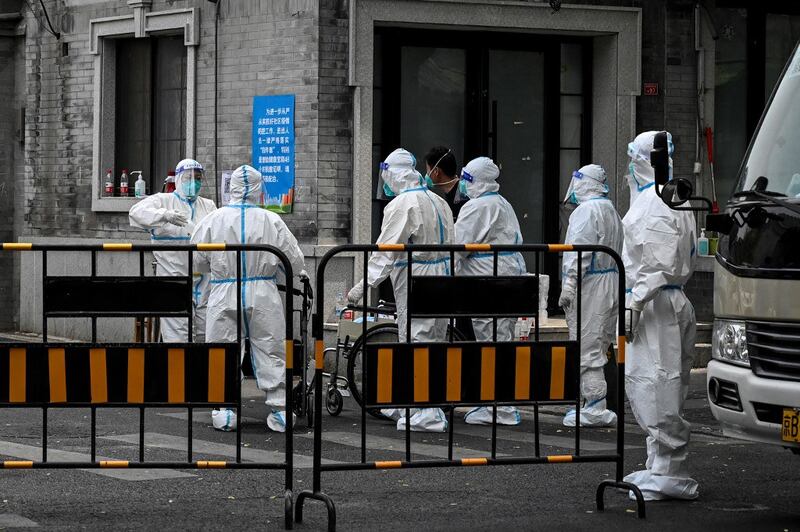Chinese censors have deleted a social media post from a university professor who hit out at the blanket surveillance deployed against Chinese citizens as part of the zero-COVID policy.
The post from Tsinghua University law professor Lao Dongyan, who has long been a vocal critic of mass surveillance and facial recognition under the ruling Chinese Communist Party (CCP), was deleted from Weibo on Monday.
Undeterred, Lao posted further comments on Wednesday, calling on the highest judicial authorities in China to pay attention to the personal privacy risks posed by big data surveillance, and for laws to limit its scope.
Lao's initial post took issue with the widespread deployment of big data surveillance as part of the Beijing municipal government's attempts to deliver on CCP leader Xi Jinping's zero-COVID policy.
Lao said government promises that citizens' data "won't be used for purposes other than disease control and prevention" weren't enough, and that legislation was needed, otherwise victims of big data leaks or theft would have no channel for redress.
"I'm human, not a zoo animal," Lao wrote on Monday. "If you want to live in captivity, that's your choice, but I don't."
"There should be some dignity to a human life, which should be more than just existence."

Limiting freedom
On Wednesday, Lao expressed concern in two fresh posts that technologies like facial recognition, voiceprint recognition, and even emotional recognition infringe on citizens' privacy, and called for legislation to limit their use.
In Beijing, a link had now been made between public transportation ticketing systems and the traffic light health code app that is mandatory for access to any public place under the zero-COVID policy.
She said the linkage gave the authorities instant access to individuals' identities, whereabouts and social connections, and that the health code app could be used indefinitely to limit citizens' freedom of movement.
She also warned that the move had greatly increased the risk of people's personal data being abused or leaked.
Lao tagged the Supreme People's Court and the highest-level state prosecutor, among other official accounts, in her post.
Tsinghua sociologist Li Zhen, who has campaigned for privacy in the face of big data, said such surveillance eventually gets used as a political tool to exert social control in China.
"Now, PCR-testing has been normalized in Beijing, with testing stations every mile, just like bus stops," Li told RFA. "The whole thing is controlled by the government, so it's totally about political control."
"This has totally destroyed the past 30 or 40 years of legal progress in China," he said. "We have moved forward, only to regress, because of technology."
Farmers targeted
The controls on people's movements aren't just limited to urban areas, either. Farmers in some areas now need to get a pass before they can work their own land.
"It's hard for me to imagine, as a farmer," Zhang Jianping told RFA. "When I was a kid in the Mao Zedong era, they would crack down on capitalism if we grew a cash crop on our private land."
"Fast forward several decades, and there are still restrictions on farmers wanting to work the land," he said. "I can't understand such disease control and prevention measures."
Beijing-based commentator Ji Feng agreed.
"Since the pandemic, our every action has been subject to government monitoring," Ji said. "The aim is simple: to bring everyone under government control."
"They are using the pandemic as a testing ground in the mass management of the population, the prevention of mass incidents [like protests], and the elimination of dissatisfaction and even resistance," he said.
U.S.-based legal scholar Teng Biao said it's entirely possible for the CCP to eliminate any public dissent through the use of high-tech surveillance.
"The high-tech system they have in China has exceeded the imaginations of political dystopia authors," Teng told RFA. "They can control every corner [of the country] and everyone in it."
"China is using the pandemic as a pretext to control the flow of information and the actions of its citizens, including the use of technologies mentioned by Lao Dongyan: voiceprint recognition; facial recognition and other biometric techniques," he said.
"This isn't just an infringement of people's right to privacy: the consequences will be far more serious than that, because people with different views [to the CCP line] will be unable to act and see no hope [for the future]," Teng said.
Teng said he is concerned for Lao's safety in the wake of her posts, and called on the international community to keep a close eye on her situation.
Translated and edited by Luisetta Mudie.
